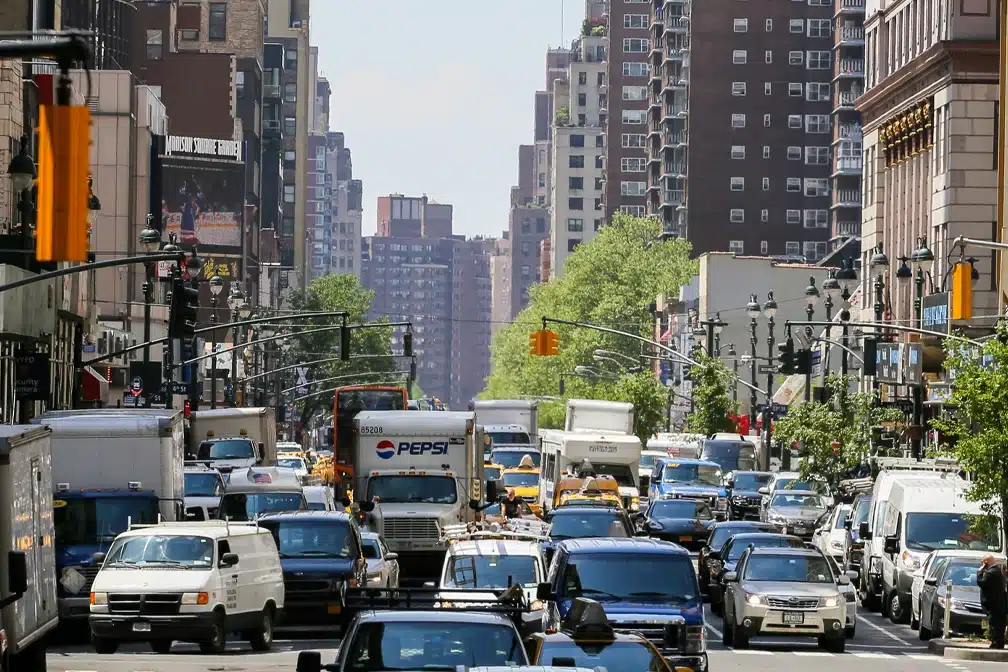July 27, 2024 10:08 am
BRINGING THE AMERICAN TRUCK DRIVER THE LATEST TRUCK DRIVER NEWS
NYC Congestion Fees May Never Happen Due to Multiple Lawsuits
Just weeks before beginning, New York City’s plan to charge NYC Congestion Fees to all drivers entering Manhattan has been put on hold indefinitely.

NYC Congestion Fees Halted Indefinitely Following Lawsuit
In a surprising turn of events, New York City’s plan to charge drivers for entering Manhattan has been put on hold indefinitely. This decision comes just weeks before the program was set to begin on June 30. Governor Kathy Hochul announced on June 5 that the program would be paused due to the rising costs of living, such as groceries, housing, and childcare.
A Shift in Policy
Governor Hochul explained that the economic situation has changed a lot since the program was approved in 2019. More people are working from home, and inflation is making everything more expensive. She believes NYC congestion fees would add to the financial burden on everyday New Yorkers, including small-business owners, police officers, firefighters, teachers, healthcare workers, and truck drivers.
“Our policies must support everyday New Yorkers and not add to their financial burdens,” Hochul said. She plans to work with local, state, and federal leaders to find a way to achieve the goals of the program without making life harder for New Yorkers.
Federal Lawsuits and Legal Challenges
The decision to pause the program comes as the Metropolitan Transportation Authority (MTA) faces multiple federal lawsuits. Just last week, the Trucking Association of New York (TANY) filed a lawsuit against the plan, arguing that the NYC congestion fees for trucks, up to $54 per trip, are unfair. This lawsuit is one of seven federal cases, including those from Rockland County, the United Federation of Teachers, and New Jersey Governor Phil Murphy. All these cases challenge the program’s environmental review process and potential impacts.
Implications for the Trucking Industry
The trucking industry has been very vocal against the congestion pricing plan. The fees for trucks entering Manhattan’s Central Business District during peak hours were set at $36 for large trucks and $24 for smaller trucks. Even the lower overnight rates posed a big burden for truckers making essential deliveries in the city.
Joe Fitzpatrick, founder of Lightning Express Delivery Service and a TANY board member, pointed out that trucks move nearly 90% of products in New York City. He suggested that the MTA either waive NYC congestion fees for trucks or set a single, lower rate to avoid heavily impacting the industry.
What’s Next?
With the congestion pricing plan on hold, the MTA’s capital program, which relies on the expected $1 billion annual revenue from the tolls, faces uncertainty. Hochul has promised to find other funding sources to support public transit improvements but has not provided specific details yet.
Hochul’s decision raises questions about the future of congestion pricing in New York City. Some wonder if the pause is temporary or a strategic move before upcoming elections. Meanwhile, legal battles continue, and the trucking industry remains hopeful for a fairer solution.
The outcome of these events will be closely watched by truck drivers, business owners, and New Yorkers who commute into the city. Everyone is keen to see how the city balances environmental goals with economic realities.
Looking Ahead
The indefinite pause on New York City’s congestion pricing plan is a big change in how the city plans to manage traffic and reduce emissions. The trucking industry’s legal challenge has shown the complexities and potential problems of such a program. As discussions continue, the focus will be on finding balanced solutions that support both the city’s needs and the financial well-being of its residents.
Recent Posts
Copyright 2024. All Rights Reserved.
